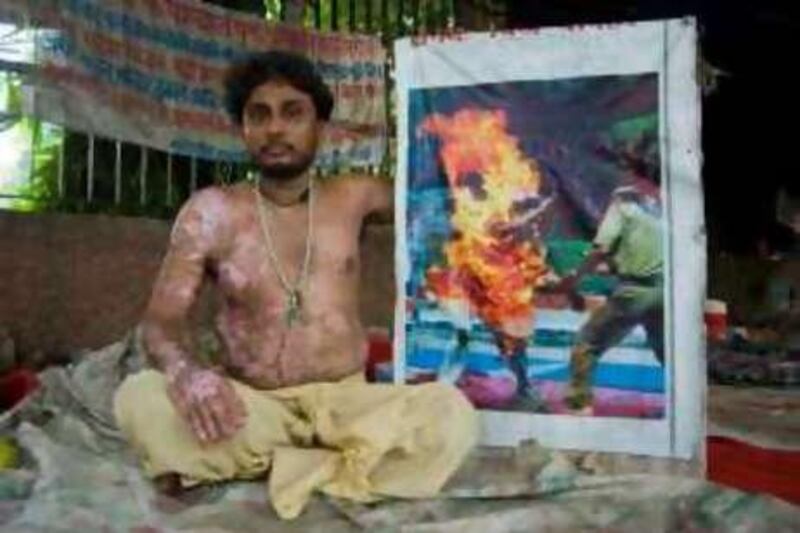NEW DELHI // Rajnish Kumar came to New Delhi for justice. His wife and three sons were missing. His land had been seized. And police in his home state of Uttar Pradesh seemed unwilling to investigate. So, on July 29 2006, the life insurance salesman stood in the middle of Jantar Mantar, the city's sanctioned space for protest, quietly poured five litres of kerosene on his body - and set himself on fire.
Afterwards, the man who took pictures of Mr Kumar as the flames engulfed him was feted with an international photography award. The police officer who arrested him was given a promotion (attempted suicide is punishable with a one-year prison term). As for Mr Kumar, he remains perched beneath a lopsided tent at a bustling end of Jantar Mantar, burns covering nearly half of his body. Homeless. Unemployed. Forgotten.
"Nothing has changed," said the 33-year-old, shrugging his shoulders. Except for the hospital bills. Mr Kumar requires around Dh350 per month for painkillers and other medications and doctors are pressing him to undergo surgery for deep, painful wounds around his chest. But for someone who has to beg for a living, that seems unlikely. Before he became one of Jantar Mantar's longest-sitting tenants, Mr Kumar made a serviceable income and supported his wife and three children while living with his father, a high-ranking bureaucrat in the local government.
After Mr Kumar's mother died, his father remarried and had six sons with his new wife. Before long there were squabbles about the family property and who had rights to what. One day, Mr Kumar's wife and three sons disappeared. Suspecting his new family was behind the abduction, Mr Kumar complained to his father. But the patriarch sided with his stepmother. Mr Kumar's claim to a property was forfeit and he was effectively exiled from the family home.
On a fateful summer day in 2006, after days of sitting in Jantar Mantar in the hope that the central government would look into his grievance, Mr Kumar made his body the ultimate beacon of protest. Today, the government has yet to acknowledge Mr Kumar. Only his charred flesh testifies to his cause, while other, noisier causes are trumpeted up and down the avenue. Jantar Mantar is becoming a bustling gallery for all manner of protest.
An activist named Sanjoy Sachdev, as the eye-catching signs surrounding him proclaimed, was on the eighth day of his hunger strike, forgoing food and water in protest of the government's system of land allotment in the troubled northern region of Kashmir and Jammu. Like a product on a showroom floor, he lay on his side, nearly unconscious, encircled by a handful of eager supporters, and a photographer snapping pictures.
"You know, when I look at these people," said Naresh Dongrai, an activist who was also sitting in protest at Jantar Mantar, "my problems seems like nothing." You would not know the well-educated man with impeccable English, idling beneath a tent, had a care in the world - until he rolled up his sleeve revealing a deep, purplish gash on his left wrist. Mr Dongrai had been tortured in jail, he said - bitten by snakes, electrocuted and beaten. His smile showcased rows of broken teeth.
All for a war of words he once had with a court in his hometown of Indore in the central Indian state of Madhya Pradesh. Mr Dongrai had been cited by a district court for contempt, having criticised a government commission in a letter. Mr Dongrai said that after a legal tussle, he was eventually arrested and jailed in New Delhi for six days. But in the end, the contempt case was discharged, no charges filed. He, too, makes his home in Jantar Mantar seeking redress - and enough money to buy food and passage back to Indore.
But Mr Dongrai admits his case pales compared to the injustices of his neighbour - the man who had to set himself on fire to get a moment's attention. Today, it is easy to overlook Mr Kumar for all the exiled Tibetans, disgruntled farmers and striking civil servants who regularly ply Jantar Mantar. He lacks the loudspeakers used by farmers to blare their demands across the thoroughfare. While Mr Kumar frequently falls into despondence over his plight, this day he was abuzz with enthusiasm. He had written a letter of support for the neighbouring delegation of protesting Tibetan refugees, and planned to present it to them later that day.
He also had a chance to tell his story to a passing visitor. Although Mr Kumar has precious few gifts to give, he dug into his pocket and presented his listener with a keychain carved from wood, bearing the word, "Friend". And these days, for Mr Kumar, those are scarcer still. @Email:ccotroneo@thenational.ae





